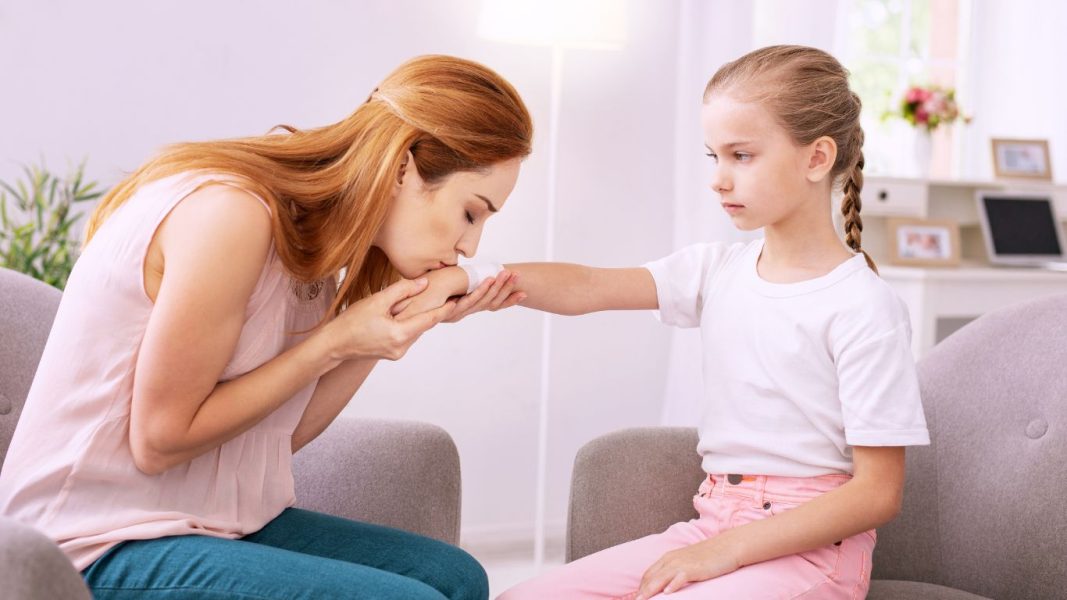As moms, we want nothing more than to see our children happy and carefree. However, it’s important to recognize that anxiety is a normal part of childhood, and effective parenting for anxious childhood is crucial. Our role as parents is to support and guide our little ones through their anxious emotions. In this blog post, I’ll share some practices that have helped me navigate my child’s anxiety, providing comfort, understanding, and tools to help them manage their emotions effectively.
Creating a Safe and Open Environment for Parenting Anxious Childhood
The first step in effective parenting for anxious childhood is to establish a safe and open environment where your child feels comfortable expressing themselves. Let your child know that their feelings are valid, and that you are there to listen and support them. This is an essential aspect of parenting for anxious childhood. Encourage open communication by having regular check-ins and dedicated one-on-one time where your child can share their worries and fears without judgment.
Validating Their Feelings in Parenting for Anxious Childhood
When your child expresses anxiety, it’s crucial to validate their feelings. Let them know that it’s okay to feel scared, worried, or anxious, and that everyone experiences these emotions at times. Avoid dismissing their concerns or telling them to “just get over it.” Instead, provide reassurance and empathy by saying things like, “I understand that you’re feeling anxious right now, and I’m here to help you through it.” Validating their feelings is an important aspect of parenting for anxious childhood.
Teaching Mindfulness and Deep Breathing Techniques for Parenting Anxious Childhood
Mindfulness and deep breathing techniques can be powerful tools for managing anxious emotions in parenting for anxious childhood. Introduce these practices to your child in a fun and age-appropriate way. Teach them to focus on their breath and guide them through simple breathing exercises during moments of anxiety. Encourage them to practice mindfulness in everyday activities, such as eating or playing, to help them stay present and grounded. Incorporating mindfulness and deep breathing techniques in parenting for anxious childhood can be highly beneficial.
Helping Them Identify Triggers and Coping Strategies in Parenting Anxious Childhood
In parenting for anxious childhood, it’s important to work with your child to identify their triggers—specific situations or events that tend to provoke anxiety. By understanding what triggers their anxiety, you can help them develop personalized coping strategies. Collaborate with your child to come up with a list of strategies that they find helpful, such as taking deep breaths, counting to ten, using positive affirmations, or engaging in a calming activity like drawing or listening to music. Identifying triggers and coping strategies is a vital aspect of parenting anxious childhood.
Setting Realistic Expectations and Celebrating Progress in Parenting Anxious Childhood
Anxiety can make even the simplest tasks seem overwhelming for children in parenting for anxious childhood. Help your child set realistic expectations for themselves and celebrate their progress, no matter how small. Encourage them to take small steps towards facing their fears and provide plenty of praise and encouragement along the way. Celebrate their bravery and resilience, reinforcing the message that they are capable of managing their anxiety. Setting realistic expectations and celebrating progress are important aspects of parenting anxious childhood.
Seeking Professional Support When Needed in Parenting Anxious Childhood
As moms, we have a wealth of knowledge and love to offer our children. However, it’s essential to recognize when professional support may be beneficial in parenting for anxious childhood. If your child’s anxiety significantly impacts their daily life, relationships, or overall well-being, consider consulting a qualified therapist or counselor who specializes in parenting for anxious childhood. They can provide additional strategies and support tailored to your child’s specific needs. Seeking professional support is an important step in ensuring your child receives the best care and guidance for managing their anxiety.
📣 Loved what you read? Want to go deeper into conscious parenting? ✨ The Power of Manifestation in Parenting is now available — A soulful guide packed with real-life tools like affirmations, energy shifts, and sleep talk that I personally use with my son, Hitarth. 💛 Start your journey toward calmer, connected parenting today. 🎉 Launch Offer: Only ₹99 (limited-time price!) 📲 Instant download. No waiting. 👉 Grab your copy now!.
Conclusion: Parenting for Anxious Childhood with Love and Support
Parenting for anxious childhood requires love, patience, and understanding. By creating a safe and open environment, validating your child’s feelings, teaching mindfulness and deep breathing techniques, helping them identify triggers and coping strategies, setting realistic expectations, and seeking professional support when needed, you can effectively support your child through their anxious emotions. Remember, every child is unique, and what works for one may not work for another. Trust your instincts as a mom, and tailor your parenting approach to meet your child’s individual needs.
Through your love and support, you can empower your child to manage their anxiety, build resilience, and thrive. Remember, you are not alone in this journey. Reach out to other moms, join support groups, or seek guidance from professionals to navigate the challenges of parenting for anxious childhood. Together, we can provide the nurturing and supportive environment our children need to grow into confident, resilient individuals.
Parenting for anxious childhood is a continuous learning process, and you are doing an incredible job as a mom. Stay patient, stay compassionate, and keep showering your child with love. You are making a difference in their lives, and your efforts will have a lasting positive impact on their emotional well-being.
Your comments and shares do more than just support our blog—they uplift the amazing moms who share their stories here. Please scroll down to the end of the page to leave your thoughts, and use the buttons just below this line to share. Your support makes a big difference!



